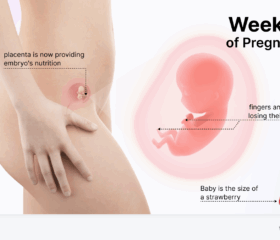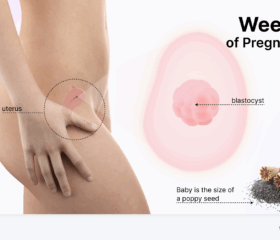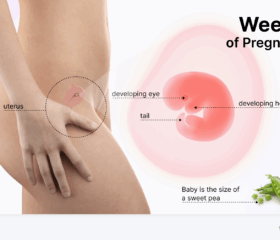Pregnancy Week by Week
7 Weeks Pregnant
Your baby is as big as a blueberry.
0.5
inches
0.04
ounces
7 Weeks Pregnant: What to Expect and What to Do
Your body is adapting to support your baby’s development. There’s a good chance that the early symptoms of pregnancy are in full swing.
If you’re like a lot of mothers-to-be, now’s when things start feeling real. This is an exciting period, but it’s also a potentially challenging one. Read on to learn more about what symptoms you may encounter and how to cope with them.
Your baby at 7 weeks
Your baby is undergoing major changes this week, especially to his:
- Brain: By the end of week 7, your baby’s brain will have separate left and right hemispheres.
- Organs: His heart, kidneys, and intestines are forming and becoming more complex. 1
- Limbs: The paddle-like structures that will become your baby’s limbs will develop webbed fingers and toes this week.
- Face: His facial features, like his eyes, nose, mouth, ears, and tongue, are starting to take shape.
How big is your baby at 7 weeks?
Your baby is about the size of a blueberry, measuring between 0.25 and 1 inches long. 2 While that might not sound that big, he’s now about 10,000 times bigger than at conception.
What can you see with an ultrasound?
Your baby’s heart has started beating. If you have a pregnancy ultrasound this week, you may catch a glimpse of this early heartbeat, although it isn’t always detectable this early. Many doctors use a transvaginal ultrasound at this stage for a clearer view of the baby’s development.
Staying safe in your first trimester
The first trimester is when your baby is most susceptible to damage from drugs, alcohol, medications, and diseases such as rubella.
While it’s obvious that you’ll need to avoid alcohol entirely when you’re pregnant, along with recreational drugs, you should also steer clear of medications such as retinoids, nasal decongestants, and nonsteroidal anti-inflammatory drugs (NSAIDs), such as Ibuprofen. 3 4
Ideally, you should already have received the measles, mumps, and rubella (MMR) vaccine before getting pregnant. You can’t get an MMR vaccine when you’re pregnant, so if you aren’t vaccinated, speak with your healthcare provider, and watch out for the symptoms of rubella.

Your body at 7 weeks
It’s not just your baby that’s transforming—you’re likely noticing changes in your own body, too, even if most of them aren’t visible to others yet.
Your breasts may feel painful when you’re pregnant, and appear fuller, with more prominent veins and darker areolas. You might (unfortunately) get breakouts of pregnancy acne due to your surging hormones. Some women also develop dark patches on their skin, known as the pregnancy mask (melasma or chloasma).
Although your uterus is expanding, you probably won’t start showing your pregnancy yet. You won’t notice a visible bump in week 7, but water retention and pregnancy bloating are common as your body adjusts to carrying a baby.
You may also notice other symptoms, such as:
- Urination: Frequent urination is another hallmark of this week, caused by increased blood flow to your pelvic region and the growth of your uterus.
- Nausea: One of the most infamous pregnancy symptoms, nausea, is often referred to as morning sickness. It tends to peak around week 7, in the middle of the first trimester. Despite the name, morning sickness isn’t limited to mornings and can strike at any time.
- Cramping and spotting: It’s normal to feel mild cramping at this stage. You may see light bleeding or spotting during your pregnancy, too, due to the changes happening in your uterus.
- Tiredness: Fatigue is also typical as your body diverts energy to build the placenta, which will nourish your baby throughout your pregnancy.
- Increased saliva: This one may catch you off guard; it’s common to produce more saliva than normal, due to hormonal changes or simply as a result of nausea.
- Heightened sense of smell: Many newly pregnant women find they’re sensitive to smells, often finding certain odors overwhelming.
- Mood swings: Be prepared for weeks 6–10, which is when pregnancy mood swings start. Emotional ups and downs are a natural response to your hormonal fluctuations and the life changes that come with pregnancy.
- Food cravings or food aversions: This is another classic pregnancy symptom. Shifts in your food preferences are also caused by your hormones and may even serve as a protective mechanism, steering you away from potentially harmful foods.
- Indigestion/constipation: You might have acid reflux (heartburn), especially after eating. In the same vein, your digestion may slow down, which could leave you pretty backed up down there and cause constipation throughout your pregnancy.
Is it normal to have no symptoms at 7 weeks?
Yes, it’s entirely normal to have mild symptoms at 7 weeks, or even no symptoms at all. Every pregnancy is unique, and the presence or absence of symptoms doesn’t necessarily indicate anything about the health of your developing baby.
If you have no symptoms at this stage, rest assured that you’re probably just one of the lucky ones. Enjoy it!
When should you consult a healthcare provider?
Some symptoms can be a sign of underlying issues. If you notice the following symptoms, contact your healthcare provider immediately:
- Severe cramping, particularly on just one side
- Heavy bleeding (not just mild spotting) that soaks through your pad
- Dizziness
- Shoulder pain
Note that if you experience any other symptoms that worry you, even if they aren’t on that list, you can still reach out to your doctor. Your mental health is important, too, and it’s never a bad idea to check in, even if you just need a little reassurance.
How to manage your pregnancy symptoms at 7 weeks
If your symptoms are getting you down, don’t worry—there are ways you can manage them, although you might not be able to get them to go away entirely.
Fatigue
Managing your pregnancy fatigue requires striking a balance between:
- Getting enough rest: Prioritize getting eight hours of sleep each night, and take short naps throughout the day if you need. You can also lean on your partner, family, or friends to help you with your chores. That’s one of the side benefits of pregnancy; after all, you’ll never have a better excuse than now.
- Staying active (within reason): While it’s important to rest, aim for 30 minutes of light exercise daily. Walking is one of the best pregnancy workouts. There are many benefits of prenatal yoga, too. These activities can boost your energy levels and improve your mood.
Cramping
You can try using a warm (not hot) compress or heating pad on your lower abdomen for short periods. However, avoid using heat directly on your belly for more than 10 minutes at a time. 5
On that note, track your spotting by using a light pad and make sure your doctor’s aware of it (this goes for any bleeding you experience during pregnancy). While sex during pregnancy is generally fine, you’ll need to avoid it if your spotting increases.
Nausea and vomiting
Morning sickness can strike at any time of day, but making small adjustments can help, such as by eating small, bland meals and avoiding strong odors.
Ginger, vitamin B6 supplements, or acupressure wristbands are common remedies that many women find effective.
Changes to your skin
For skincare concerns like acne, stick to gentle cleansers and moisturizers. If you notice dark patches on your skin (chloasma), apply sunscreen with SPF 30 or higher and wear a hat when you’re outdoors.
Check with your healthcare provider before using any new medication
Even if you previously used a product before your pregnancy, consult with your healthcare provider before using it. Some products are unsuitable for pregnant women, and it’s important to check.
Heartburn and indigestion
Avoid triggers such as spicy, fatty, or acidic foods. Drinking water between meals rather than with them can also help.
Mood swings
Prioritize rest, practice self-care, and maintain open communication with your loved ones about how you’re feeling. Most importantly, if you find your emotions going crazy, remind yourself that these feelings are normal. Be nice to yourself, and give yourself time to adjust to this new stage of life.
How to combat your cravings and get enough nutrition
Cater to your cravings in moderation, and if you find certain foods becoming unappealing, try substitutes. For instance, you can swap out meat for plant-based protein if the smell of cooking meat turns your stomach.
Try to eat small, nutrient-rich meals throughout the day. Including high-fiber foods like fruit, vegetables, and whole grains in your pregnancy diet can also help with constipation.
At 7 weeks pregnant, you need to make sure you’re getting enough of the following nutrients:
Vitamin D
Vitamin D is important for maintaining healthy bones and teeth (for both you and your baby!), as well as supporting your immune system.
Some evidence suggests it could reduce the risk of certain complications, such as preeclampsia (a condition that causes high blood pressure and organ problems in mothers) or preterm birth. 6
Where to find it: Fortified milk, egg yolks, salmon, and sun exposure (at safe levels).
Iron
During pregnancy, your blood volume increases by about 50% to support your growing baby and placenta. Iron is a key component of your blood, and it’s important to get enough of it to make sure you stay healthy.
Where to find it: Lean meats, poultry, fish, beans, spinach, and fortified cereals.
Zinc
Getting enough zinc ensures your immune system functions well. It also plays a role in your baby’s cell division and tissue growth.
Where to find it: Meat, shellfish, nuts, seeds, and whole grains.
Folic acid (vitamin B9)
Folic acid helps prevent your baby from developing neural tube defects, such as spina bifida.
Where to find it: Leafy greens, citrus fruits, fortified cereals, and beans.
Omega-3 fatty acids (DHA and EPA)
You might already know about the benefits of getting enough omega-3 fatty acids (many people who don’t get enough through their diets choose to take supplements for this). Omega-3 supports your baby’s brain and eye development.
Where to find it: Fatty fish (like salmon, mackerel, and sardines), walnuts, flaxseeds, and chia seeds.
Vitamin C
Vitamin C boosts your immune system, helps your body absorb iron, and keeps your skin and tissues healthy.
Where to find it: Citrus fruits, bell peppers, strawberries, broccoli, and tomatoes.
Protein
Protein provides the building blocks for your baby’s growing cells, tissues, and organs.
Where to find it: Lean meats, poultry, fish, eggs, beans, lentils, nuts, seeds, and dairy products.
Speak to your doctor if you have particularly unusual cravings
If you’re experiencing unusual cravings for non-food items like dirt or clay, it may be a sign that you have pregnancy-related pica, and you should consult your doctor to check for nutrient deficiencies.
What prenatal care and planning happens at 7 weeks?
This stage of pregnancy features important milestones in your and your baby’s development.
Your first prenatal visit
At 7 weeks, you may have your first pregnancy appointment; if not, you’re probably preparing for it.
In this visit, your healthcare provider will typically conduct various tests, including taking a urine sample and performing a pap smear. This is nobody’s favorite activity, but it’s important, since it will help them confirm that your pregnancy is proceeding normally and your baby is healthy.
How to prepare for your first prenatal visit
If you’re gearing up for your first prenatal visit, there are some things you’ll need to prepare beforehand:
- Family history: You’ll need to provide your medical history. Ideally, you’ll also provide your family history to help your provider check for hereditary conditions.
- Conception date: If you know your conception date and the date of your last menstrual period, let your provider know.
- Your birth plan: You may also want to discuss your birth plan with your healthcare provider. This means outlining your preferences for labor, delivery, and postpartum care.
- Any burning questions: Write down any other questions you have so that you don’t forget them in the moment. For instance, you may be wondering what food you can eat, how much weight you can expect to gain, or when you’ll be able to feel your baby moving.
You could also try using a pregnancy tracker app to keep track of your symptoms, important milestones, subsequent appointments, and vaccinations (note that you can get the flu shot while pregnant).
Prenatal screenings
Consider getting one of these prenatal screenings:
- Viability ultrasound: This is an ultrasound scan that will produce an image of your baby. Your doctor can calculate your due date with this ultrasound and confirm that your pregnancy is developing normally.
- Prenatal blood test: Your doctor can use a blood test to check your blood type and Rh factor (a protein that may be found on the surface of red blood cells). If you’re Rh-negative (you don’t have the protein) and your baby is Rh-positive (your baby has it), your body will produce antibodies that damage your next baby’s red blood cells, so you’ll need a RhoGAM shot. A blood test can also check for STIs and certain genetic conditions, such as cystic fibrosis.
Discuss these screenings with your healthcare provider to figure out what’s right for you.
Announcing your pregnancy
When to announce your pregnancy is, ultimately, up to you. Some women wait until after the first trimester, when the risk of miscarriage decreases, while others share the news earlier, at least with close family and friends.
If you’re working, consider the dynamics of your workplace and whether sharing the news early might help explain symptoms like fatigue or nausea.
How common are miscarriages at 7 weeks?
Miscarriage is most common in the first trimester, occurring in about 10% of clinically recognized pregnancies. As your pregnancy progresses, this risk will decrease.
If you’re a single mother, there are resources for you
Dealing with pregnancy (and the logistics of arranging your prenatal care) by yourself can feel overwhelming, but there are support networks out there for single pregnant women. You can look for support groups in your local area, or you can reach out to the American Pregnancy Association to speak with someone.
Alternatively, if you can’t meet anyone in person or speak over the phone, some of the best pregnancy trackers out there also have in-app communities and forums that you can join.
Final thoughts
As you embark on your seventh week of pregnancy, remember that your pregnancy is unique—there’s no one-size-fits-all.
Reach out to your partner, family, friends, community, or healthcare for support when you need it. If your symptoms get overwhelming, remind yourself that they often decrease in the second trimester. You’re almost halfway there.
Congratulate yourself on making it this far, and treat yourself; you’ve earned it!
Article Sources
- Johns Hopkins Medicine. "The First Trimester" Retrieved June 23, 2025.
- Charlotte Lozier Institute. "Week 7" Retrieved June 23, 2025.
- GoodRx. "12 Medications That Can Be Dangerous to Take If You’re Pregnant" Retrieved June 23, 2025.
- U.S. Food and Drug Administration. "Medicine and Pregnancy" Retrieved June 23, 2025.
- Medical News Today. "Can you use a heating pad while pregnant?" Retrieved June 23, 2025.
- World Health Organization. "e-Library of Evidence for Nutrition Actions (eLENA)" Retrieved June 23, 2025.







